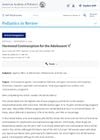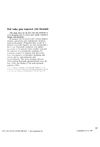 January 2016 in “Springer eBooks”
January 2016 in “Springer eBooks” Hyperandrogenism, often causing excessive hair growth and acne, can be treated with methods like weight reduction, hair removal, various medications, and in the case of acne, topical treatments.
January 2014 in “Healthy aging research” Polycystic ovarian disease symptoms can continue after menopause, making diagnosis and management in older women challenging.
 March 2013 in “Journal of pediatric nursing”
March 2013 in “Journal of pediatric nursing” The case emphasizes the need for careful screening in children for insulin resistance and related conditions.
 November 2008 in “Pediatrics in Review”
November 2008 in “Pediatrics in Review” Hormonal birth control pills are commonly used by teens but often fail due to incorrect use.
 March 2006 in “Archives of Dermatology”
March 2006 in “Archives of Dermatology” Topical steroids help Erosive Lichen Planus, finasteride with birth control aids Female Pattern Hair Loss, young age helps Occupational Hand Eczema prognosis, quitting smoking is key for Diffuse Dermal Angiomatosis, and a 3-site Botulinum Toxin A injection is effective for glabellar wrinkles.
Most excessive hair growth is due to idiopathic hirsutism or PCOS; treatment starts with cosmetic methods and drugs like cyproterone acetate or spironolactone, with results in 6-12 months.
 August 1996 in “Journal of Pediatric and Adolescent Gynecology”
August 1996 in “Journal of Pediatric and Adolescent Gynecology” The document concludes that PCOS in adolescents is complex and requires comprehensive care to manage its symptoms and associated health risks.
 November 1990 in “Inpharma weekly”
November 1990 in “Inpharma weekly” Flutamide effectively treated hair growth and related symptoms in women, with common side effects like dry skin and hot flushes.
February 1978 in “PubMed” Some birth control pills can cause temporary or more serious hair loss.
 October 1971 in “The BMJ”
October 1971 in “The BMJ” Hair loss can be linked to hormonal changes, and physical conditions like heart defects can cause depression.

Oral contraceptives may cause significant hair loss in women.
March 2023 in “Journal of Drugs in Dermatology” Hormonal therapies, especially antiandrogens, can help manage Hidradenitis Suppurativa.
January 2023 in “European journal of biology and medical science research” PCOS symptoms can be managed with medication and lifestyle changes.
 April 2006 in “Faculty Opinions – Post-Publication Peer Review of the Biomedical Literature”
April 2006 in “Faculty Opinions – Post-Publication Peer Review of the Biomedical Literature” Oral finasteride, combined with drospirenone, improved hair loss in 62% of premenopausal women, with no reported side effects.
67 citations,
March 2018 in “The Journal of Clinical Endocrinology & Metabolism” Oral contraceptives and antiandrogens are effective for treating hirsutism, with antiandrogens being the most effective.
 30 citations,
April 1997 in “European journal of endocrinology”
30 citations,
April 1997 in “European journal of endocrinology” The document concludes that managing hirsutism involves identifying the cause, using a scoring system for severity, combining cosmetic and medical treatments, encouraging weight loss, and providing psychological support, while noting the need for more research on drug treatments.
 26 citations,
October 2016 in “Clinics in Dermatology”
26 citations,
October 2016 in “Clinics in Dermatology” Hormonal treatments can improve acne, but they come with potential side effects and risks.
 20 citations,
April 2006 in “Dermatologic Clinics”
20 citations,
April 2006 in “Dermatologic Clinics” Antiandrogen therapies are beneficial for treating skin and hair conditions related to androgen levels.
 12 citations,
October 2004 in “Expert Opinion on Investigational Drugs”
12 citations,
October 2004 in “Expert Opinion on Investigational Drugs” Treatments for Polycystic Ovary Syndrome (PCOS) focus on reducing symptoms, restoring regular periods, and helping with pregnancy. Common treatments include hormone suppressors, fertility drugs, and insulin-sensitising agents.
 6 citations,
August 2023 in “Fertility and Sterility”
6 citations,
August 2023 in “Fertility and Sterility” The 2023 guideline for PCOS suggests using updated diagnostic criteria, assessing related health risks, and recommends lifestyle changes and specific treatments for symptoms and fertility issues.
 6 citations,
January 2017 in “Dermato-endocrinology”
6 citations,
January 2017 in “Dermato-endocrinology” ADT-G may be a useful indicator of increased androgen levels in women with acne and can be lowered with certain birth control pills.
 5 citations,
January 2024 in “Journal of the American Academy of Dermatology”
5 citations,
January 2024 in “Journal of the American Academy of Dermatology” Use benzoyl peroxide, retinoids, antibiotics, and isotretinoin for acne, and combine treatments for better results.
5 citations,
October 2017 in “JOGC/Journal of obstetrics and gynaecology Canada” The conclusion is that proper diagnosis and long-term treatment, including medication, hair removal, and lifestyle changes, are important for improving hirsutism, especially in PCOS patients.
 4 citations,
June 2007 in “PubMed”
4 citations,
June 2007 in “PubMed” Effective management of PCOS includes lifestyle changes, medication for menstrual regulation, fertility treatments, and cosmetic issue remedies.
2 citations,
July 2012 in “Obstetrics, gynaecology and reproductive medicine” Hirsutism in women often indicates health issues like polycystic ovarian syndrome and is treated with lifestyle changes, medication, and cosmetic measures.
 1 citations,
August 2013 in “Springer eBooks”
1 citations,
August 2013 in “Springer eBooks” Birth control pills and anti-androgen medications help manage hair growth, acne, and hair loss in women with PCOS.
 April 2023 in “Expert opinion on pharmacotherapy”
April 2023 in “Expert opinion on pharmacotherapy” Birth control pills and antiandrogens are the most effective medicines for excessive body hair in women, but combining them with other treatments and psychological support is best.
 December 2022 in “OBG Management”
December 2022 in “OBG Management” The conclusion is to diagnose PCOS with just hyperandrogenism and irregular periods, and treat with lifestyle changes and basic medications.
 September 2022 in “Women's healthcare”
September 2022 in “Women's healthcare” PCOS is managed by lifestyle changes and personalized medication to improve symptoms and fertility.
May 2021 in “Journal of the Endocrine Society” Adolescents with PCOS have higher levels of certain androgens, which are linked to hair growth but don't help diagnose PCOS better than testosterone levels.





















